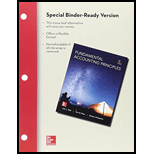
Loose Leaf for Fundamentals of Accounting Principles and Connect Access Card
22nd Edition
ISBN: 9781259542169
Author: John J Wild
Publisher: McGraw-Hill Education
expand_more
expand_more
format_list_bulleted
Question
Chapter 15, Problem 11DQ
To determine
Introduction:
Investment in securities: An investment in the security of another company can and influencing investment or non influencing on the basis of type of investment made. An influencing investment in securities provides the controlling or influencing power to the investor in the company.
Influencing investments can be classified into two major types as follows:
- Controlling interest: In this case the investor holds more than 50% equity of the company and it has control over the management of the company. The accounts of the company are required to be consolidated in such cases.
- Significant influence: In this case the investor holds more than 20% but less than 50% equity of the company and it has significant influence over the management of the company. The investor follows the equity method to account such type of investments.
Non influencing investments can be classified into three major types as follows:
- Held to maturity: Held to maturity is a type of investment that the investor intends to hold till maturity. These securities are recorded at cost.
- Trading: Trading securities are purchased by the investor for the purpose to sell within a short term period to each profit. These securities are recorded at their fair value and any gain or loss in recognized in the income statement for that period.
- Available for sale: All the other securities are considered as available for sale and these securities are recorded at their fair value and any gain or loss is recognized unrealized gain or loss until the securities are actually sold.
To determine: The circumstances when a company prepare consolidated financial statements.
Expert Solution & Answer
Want to see the full answer?
Check out a sample textbook solution
Students have asked these similar questions
What is the sales volume variance for total revenue?
Provide Answer
Can you solve this general accounting problem with appropriate steps and explanations?
Chapter 15 Solutions
Loose Leaf for Fundamentals of Accounting Principles and Connect Access Card
Ch. 15 - Prob. 1DQCh. 15 - Prob. 2DQCh. 15 - Prob. 3DQCh. 15 - Prob. 4DQCh. 15 - Prob. 5DQCh. 15 - Prob. 6DQCh. 15 - Prob. 7DQCh. 15 - Prob. 8DQCh. 15 - Prob. 9DQCh. 15 - Prob. 10DQ
Ch. 15 - Prob. 11DQCh. 15 - Prob. 12DQCh. 15 - Prob. 13DQCh. 15 - Prob. 14DQCh. 15 - Prob. 15DQCh. 15 - Prob. 16DQCh. 15 - Prob. 17DQCh. 15 - Prob. 1QSCh. 15 - Prob. 2QSCh. 15 - Prob. 3QSCh. 15 - Prob. 4QSCh. 15 - Prob. 5QSCh. 15 - Prob. 6QSCh. 15 - Prob. 7QSCh. 15 - Prob. 8QSCh. 15 - Prob. 9QSCh. 15 - Prob. 10QSCh. 15 - Prob. 11QSCh. 15 - Prob. 12QSCh. 15 - Prob. 13QSCh. 15 - Prob. 14QSCh. 15 - Prob. 15QSCh. 15 - Prob. 16QSCh. 15 - Prob. 17QSCh. 15 - Prob. 18QSCh. 15 - Exercise 15-1 Debt and equity securities and shod-...Ch. 15 - Prob. 2ECh. 15 - Brooks Co. purchases various investments in...Ch. 15 - Prob. 4ECh. 15 - Prob. 5ECh. 15 - Prob. 6ECh. 15 - Prob. 7ECh. 15 - Prob. 8ECh. 15 - Prob. 9ECh. 15 - Prob. 10ECh. 15 - Prob. 11ECh. 15 - Prob. 12ECh. 15 - Prob. 13ECh. 15 - Prob. 14ECh. 15 - Prob. 15ECh. 15 - Prob. 16ECh. 15 - Prob. 17ECh. 15 - Prob. 1APSACh. 15 - Prob. 2APSACh. 15 - Prob. 3APSACh. 15 - Prob. 4APSACh. 15 - Prob. 5APSACh. 15 - Prob. 6APSACh. 15 - Prob. 1BPSBCh. 15 - Prob. 2BPSBCh. 15 - Prob. 3BPSBCh. 15 - Prob. 4BPSBCh. 15 - Prob. 5BPSBCh. 15 - Prob. 6BPSBCh. 15 - Prob. 15SPCh. 15 - Prob. 1GLPCh. 15 - Prob. 2GLPCh. 15 - Prob. 1BTNCh. 15 - Prob. 2BTNCh. 15 - Kasey Hartman is the controller for Wholemart...Ch. 15 - Prob. 4BTNCh. 15 - Prob. 5BTNCh. 15 - Prob. 6BTNCh. 15 - Prob. 7BTNCh. 15 - Prob. 8BTNCh. 15 - Prob. 9BTN
Knowledge Booster
Similar questions
- Please provide the correct answer to this financial accounting problem using valid calculations.arrow_forwardCan you explain the process for solving this financial accounting question accurately?arrow_forwardCrestview Manufacturing produces a product with a standard direct labor cost of 2.2 hours at $21.75 per hour. During September, 1,850 units were produced using 3,980 hours at $20.25 per hour. The labor quantity variance was $__.arrow_forward
arrow_back_ios
SEE MORE QUESTIONS
arrow_forward_ios
Recommended textbooks for you

 AccountingAccountingISBN:9781337272094Author:WARREN, Carl S., Reeve, James M., Duchac, Jonathan E.Publisher:Cengage Learning,
AccountingAccountingISBN:9781337272094Author:WARREN, Carl S., Reeve, James M., Duchac, Jonathan E.Publisher:Cengage Learning, Accounting Information SystemsAccountingISBN:9781337619202Author:Hall, James A.Publisher:Cengage Learning,
Accounting Information SystemsAccountingISBN:9781337619202Author:Hall, James A.Publisher:Cengage Learning, Horngren's Cost Accounting: A Managerial Emphasis...AccountingISBN:9780134475585Author:Srikant M. Datar, Madhav V. RajanPublisher:PEARSON
Horngren's Cost Accounting: A Managerial Emphasis...AccountingISBN:9780134475585Author:Srikant M. Datar, Madhav V. RajanPublisher:PEARSON Intermediate AccountingAccountingISBN:9781259722660Author:J. David Spiceland, Mark W. Nelson, Wayne M ThomasPublisher:McGraw-Hill Education
Intermediate AccountingAccountingISBN:9781259722660Author:J. David Spiceland, Mark W. Nelson, Wayne M ThomasPublisher:McGraw-Hill Education Financial and Managerial AccountingAccountingISBN:9781259726705Author:John J Wild, Ken W. Shaw, Barbara Chiappetta Fundamental Accounting PrinciplesPublisher:McGraw-Hill Education
Financial and Managerial AccountingAccountingISBN:9781259726705Author:John J Wild, Ken W. Shaw, Barbara Chiappetta Fundamental Accounting PrinciplesPublisher:McGraw-Hill Education


Accounting
Accounting
ISBN:9781337272094
Author:WARREN, Carl S., Reeve, James M., Duchac, Jonathan E.
Publisher:Cengage Learning,

Accounting Information Systems
Accounting
ISBN:9781337619202
Author:Hall, James A.
Publisher:Cengage Learning,

Horngren's Cost Accounting: A Managerial Emphasis...
Accounting
ISBN:9780134475585
Author:Srikant M. Datar, Madhav V. Rajan
Publisher:PEARSON

Intermediate Accounting
Accounting
ISBN:9781259722660
Author:J. David Spiceland, Mark W. Nelson, Wayne M Thomas
Publisher:McGraw-Hill Education

Financial and Managerial Accounting
Accounting
ISBN:9781259726705
Author:John J Wild, Ken W. Shaw, Barbara Chiappetta Fundamental Accounting Principles
Publisher:McGraw-Hill Education